|
|
|
Sort Order |
|
|
|
Items / Page
|
|
|
|
|
|
|
| Srl | Item |
| 1 |
ID:
075805


|
|
|
|
|
| Publication |
2006.
|
| Summary/Abstract |
examine the determinants of conflict and settlement by embedding probabilistic contests in a bargaining framework. Different costly enforcement efforts (e.g. arming, litigation expenditures) induce different disagreement points and Pareto frontiers. After examining the incentives for settlement, I demonstrate how different division rules and bargaining norms have real, economic effects. I then analyze some sources of conflict. I emphasize long?term, strategic considerations by examining an illustrative model and discussing particular historical examples.
|
|
|
|
|
|
|
|
|
|
|
|
|
|
|
|
| 2 |
ID:
170708


|
|
|
|
|
| Summary/Abstract |
This article examines the Zionist business activity in Cyprus during the 1930s and discusses the motives of its ‘relocation’ from Mandatory Palestine to the neighbouring island. By examining the profile of the investors, the article argues that ideological and economic considerations shaped Jewish business networking in the Eastern Mediterranean. Apart from the benefits of trade protectionism, most of the Jewish ventures were run in Cyprus by businessmen devoted to Zionism, whose companies on the island would not only benefit them economically, but further support their role as economic carriers of the future Jewish state. Behind their business engagement, there was also the idea of generating Jewish-friendly settlements close to Palestine, where Jews from Central Europe could be accommodated as the migratory flow from Central Europe in the 1930s was increasing. This particular form of business activity marked also the rise of a Zionist business culture, which relied heavily on British markets.
|
|
|
|
|
|
|
|
|
|
|
|
|
|
|
|
| 3 |
ID:
155941
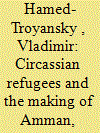

|
|
|
|
|
| Summary/Abstract |
In the final decades of Ottoman rule, several waves of refugees from the Russian Empire's North Caucasus region immigrated to Transjordan, where they founded Amman and other agricultural villages. This article examines the economy of Amman in its formative years as a Circassian refugee settlement. By exploring connections between North Caucasian refugees, Syrian and Palestinian merchants, and Transjordanian urban and nomadic communities, this study posits refugees as drivers of economic expansion in the late Ottoman period. I argue that the settlement of North Caucasian refugees and their active participation in the real estate market in and around Amman contributed to the entrenchment of the post-1858 property regime in Ottoman Transjordan. Through a study of an upper-class Circassian household and its legal battles, this article also illustrates the rise of refugee elites who benefited from the commodification of land and the construction of state-sponsored infrastructure in the late Ottoman Levant.
|
|
|
|
|
|
|
|
|
|
|
|
|
|
|
|
| 4 |
ID:
156862
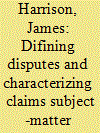

|
|
|
| 5 |
ID:
186147
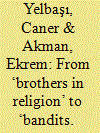

|
|
|
|
|
| Summary/Abstract |
This article analyses the mass migration of Chechens to the Ottoman Empire between the mid-1860s and the 1900s. The Russian expansion to the North Caucasus transformed the entire region surrounding the Black Sea, including its demography, governance and politics. This expansion took place in several phases. The first resulted in a major mass migration by several North Caucasian groups, who abandoned the region in response to the increasing presence of Russian military personnel. During the second stage, the exodus of these groups accelerated because of massacres committed by the Russian military in an attempt to take complete control. Many North Caucasians were exiled to Ottoman lands, arriving en masse, either on foot, or by sailing across the Black Sea.
|
|
|
|
|
|
|
|
|
|
|
|
|
|
|
|
| 6 |
ID:
148186
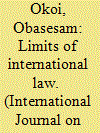

|
|
|
| 7 |
ID:
169291


|
|
|
|
|
| Summary/Abstract |
Several national governments have recently taken substantial steps toward creating policies that apply to new, path-breaking activities at asteroids in outer space. Near-term activities on asteroids are likely to be various, including mining initiated by private firms and planetary defense activities pursued by public agencies. Current perspectives on making policy toward asteroid activities often presume that the different goals pursued by actors interested in asteroids are mutually supportive and that diverse actors’ common focus on asteroids builds momentum for creating an enabling policy environment. In contrast, we argue that the 4 main categories of asteroid activities envisioned today—scientific research (science), human settlement of other parts of the solar system (settlement), planetary defense (security), and mining (sales)—are best served by policy regimes with distinct features. Different activities require different policy arrangements, which are not straightforwardly compatible. The incompatibilities present policymakers with trade-offs. This article discusses the 4 main types of asteroid activities and their related policy needs to highlight these trade-offs and influence debate.
|
|
|
|
|
|
|
|
|
|
|
|
|
|
|
|
| 8 |
ID:
173787
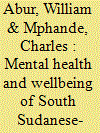

|
|
|
|
|
| Summary/Abstract |
The majority of South Sudanese-Australians arrived in Australia, and other host countries outside Africa, after spending a greater part of their lives in refugee camps or conflict-affected areas. In addition, refugees are often not able to return to their home countries because the causes of their departure (wars, insecurity, hunger) continue to apply in their country of origin. The purpose of this paper is to examine some of the mental health and wellbeing issues some South Sudanese-Australians experience as a result of settlement difficulties and their earlier experience of conflict. The study looks at experiences of resettlement and settlement difficulties, and, more importantly, mental health and wellbeing issues in the wake of the aforesaid challenges. The data was collected from a qualitative method which comprised a series of semi-structured, one-on-one interviews with a total of 20 South Sudanese-Australians living in Melbourne. There were 11 males and nine females, with ages ranging from 18 to 64 years, who volunteered to participate in this study. Findings indicated that, as with many other people from refugee backgrounds, South Sudanese-Australians face a range of settlement-related challenges, and a host of post-resettlement adaptation experiences such as limited change of gender roles, language proficiency, unemployment, host society unacceptance or intolerance, constrained recreational opportunities, lack of community connectedness and overall mental health and general wellbeing issues. Experiencing conflict can be traumatic and refuge in neighbouring countries that are socio-culturally different can be challenging. In conclusion, these issues can not only be troublesome on a day-to-day basis, but also adversely affect the long-term mental health and wellbeing of refugees.
|
|
|
|
|
|
|
|
|
|
|
|
|
|
|
|
| 9 |
ID:
110835


|
|
|
|
|
| Publication |
2012.
|
| Summary/Abstract |
Since the beginning of the 1990s, there has been growing academic interest in the speech act of apology. Both the nature of apologetic communicative processes and the potential of apologies to promote reconciliation remain, however, under debate. The aim of this article is to map common types of rituals found in what is termed 'the age of apology', to identify the processual and structural characteristics of these rituals, and to understand their contribution to restoring relations in the global arena. The analysis yields three types of rituals of apology: purification - that is, asymmetrical rituals in which the offender issues an apology in order to purify his or her dismal past but does not necessarily need the approval of an offended party; humiliation - that is, asymmetrical rituals in which the offended party forces the offender to participate in a degradation ritual as a condition for closure; and settlement - that is, symmetrical rituals in which both sides strive to restore relations. The theoretical and practical implications of these rituals are discussed.
|
|
|
|
|
|
|
|
|
|
|
|
|
|
|
|
| 10 |
ID:
139240
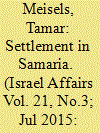

|
|
|
|
|
| Summary/Abstract |
This essay presents the interests of settlers and settler nations in a new and favourable light, with reference to the Jewish settlements in Samaria in particular. It sets out two lines of argument supporting the inclusion of the Jewish settlement blocs in Samaria into the State of Israel. It argues that taking existing national settlements into account as a major factor in marking boundaries has both distinctly liberal foundations (in John Locke's Second Treatise) and liberal-national appeal. The paper also considers historical reasons for supporting the Zionist settlement project from the start, and within Samaria in particular. Finally, it addresses the complicated and controversial issue of settlement in disputed territories. Ultimately I suggest that Israel has a particularly strong case for entitlement to the territories to which it lays claim, though these interests must compete with countervailing considerations and may not always prevail.
|
|
|
|
|
|
|
|
|
|
|
|
|
|
|
|
| 11 |
ID:
107485
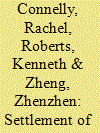

|
|
|
|
|
| Publication |
2011.
|
| Summary/Abstract |
This paper considers economic models of migration in the context of current Chinese migration. We argue that using formally changing one's household registration (hukou) location is too narrow a definition of settlement for policy purposes. Instead we show that time in the city and co-residence with spouses and separately with children reveals systematic settlement behavior on the part of a subset of migrants. The empirical evidence offered is largely descriptive but shows that those migrants who were younger at the age of migration, who are currently married and self-employed spend more years in the city. Men who have been in the city longer and are self-employed are much more likely to be co-residing with their wife. Self-employment is also a predictor of co-residence with children for both mothers and fathers.
|
|
|
|
|
|
|
|
|
|
|
|
|
|
|
|
| 12 |
ID:
089418
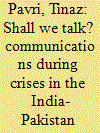

|
|
|
|
|
| Publication |
2009.
|
| Summary/Abstract |
This article examines selected crises that have arisen between India and Pakistan in the post-independence period and asks if communications between the two sides, whether direct or indirect, have made a difference in whether the crisis has escalated to war or been settled short of it. It finds that both kinds of communication have succeeded in building trust during escalating crises and that this may have led to settlements short of war. It also suggests that the content of communication is important and that positive messages sent through either channel have led to successful outcomes. It calls for the maintenance of sustained and dedicated communication channels that will remain in place and continue to build trust after crises are settled, rather than the ad hoc ways in which the two countries have communicated during crises thus far.
|
|
|
|
|
|
|
|
|
|
|
|
|
|
|
|
| 13 |
ID:
102494


|
|
|
|
|
| Publication |
2011.
|
| Summary/Abstract |
Regardless of the types of civil conflict settlements, all parties generally enter into some sorts of tacit or direct bargaining in the course of civil conflict, namely, in steps toward peace. In contrast to a basically static framework employed in much of existing literature on civil war settlements and mediation, this article proposes a disaggregate approach to dynamic and multi-phase processes in civil conflict termination via negotiations. We illustrate a conceptual and theoretical framework to examine four steps in civil conflict settlements in a large-N research program. In so doing, we present an initial effort to construct a dyadic dataset isolating processes that allow civil conflict settlements to progress or regress between low and higher levels of agreement in the Asia-Pacific region from 1990 to 2005. We discuss a set of preliminary simple statistical results for the four distinct settlement phases in the context of conflict and rebel characteristics. Among the findings of note, third parties provide important assistance in nurturing successful negotiations especially in the context of waning insurgent strength. Peace proposals originate most frequently from governments, and seem to hinge especially on opponents' battlefield advantages. Evidence of mutually hurting stalemates is also found. In the article's conclusion we elaborate a long-term research agenda.
|
|
|
|
|
|
|
|
|
|
|
|
|
|
|
|
| 14 |
ID:
102492
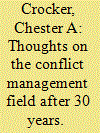

|
|
|
|
|
| Publication |
2011.
|
| Summary/Abstract |
This article surveys the emergence of conflict management from the academic and policy shadows into a far more prominent field of inquiry and practice. As the barriers to entry into third party roles collapsed at the end of the Cold War, the field of conflict management expanded, diversified, and fragmented into a range of practice areas (scholarly, policy-oriented, and operational). Four phases of this evolution are identified. An increasingly crowded field lacks gatekeepers or natural coherence, underscoring the need for leadership and sustained, coordinated efforts. The study of mediation has blossomed around the work of Zartman and others, while the policy community has swung back and forth in its enthusiasm for third party roles in an age where hard power and smart power vie for pride of place. Conflict management responses are increasingly spontaneous, ad hoc and case-specific. Debate is emerging over the pros and cons of engaging with armed non-state actors that are placed on proscribed lists in the struggle against terrorism. Post-conflict challenges continue to pose a severe test to practitioners of peacebuilding.
|
|
|
|
|
|
|
|
|
|
|
|
|
|
|
|
| 15 |
ID:
117689
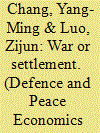

|
|
|
|
|
| Publication |
2013.
|
| Summary/Abstract |
This paper presents an economic analysis of the optimal choice between war and settlement when armed conflicts involve weapon costs and endogenously increasing destruction to consumable resources. In contrast to some earlier findings in the conflict literature, we derive conditions under which war dominates settlement as the Nash equilibrium choice in a one-period game without incomplete information or misconceptions. These conditions are shown to depend not only on resources allocated to the production of military weapons, but also on the endogenous destructiveness of weapons used in warfare. We show that contending parties always allocate more resources to arms productions under settlement (in the shadow of conflict) than under war. When total destruction is less than the difference in arms productions between settlement and war, each party's expected payoff is relatively higher under war. As a result, war dominates settlement. But, when total destruction is greater than the difference in arms productions between settlement and war, each party's expected payoff is relatively higher under settlement. In this case, settlement dominates war and the larger scale of destructiveness associated with higher arms levels generates an effective deterrence for 'armed peace'. One implication of the positive analysis is that, under the threat of conflict, arms reductions for promoting peace can never be voluntary.
|
|
|
|
|
|
|
|
|
|
|
|
|
|
|
|
|
|
|
|
|